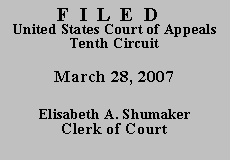

| UNITED STATES OF AMERICA, |
|
| v. | |
| BENJAMIN CAMPOS-DAVILA, |
We review sentences imposed post-Booker for reasonableness. United States v. Kristl, 437 F.3d 1050, 1053 (10th Cir. 2006). "[A] sentence that is properly calculated under the [United States Sentencing] Guidelines [USSG] is entitled to a rebuttable presumption of reasonableness." Id. at 1054. "The defendant may rebut this presumption by demonstrating that the sentence is unreasonable in light of the other sentencing factors laid out in [18 U.S.C.] § 3553(a)." Id. at 1055.
Campos-Davila's sentence was properly calculated under the USSG. The guideline applicable for a conviction under 8 U.S.C. § 1326 is USSG § 2L1.2. Under this guideline, the base offense level is eight. USSG § 2L1.2(a). But this guideline calls for a sixteen-level enhancement if the defendant was previously deported or remained in the United States after a felony conviction for a "crime of violence." USSG § 2L1.2(b)(1)(A)(ii). The commentary to USSG § 2L1.2 defines "crime of violence" as including burglary of a dwelling.
Campos-Davila was deported on August 15, 2003 and again on December 30, 2003. Prior to being deported, he was convicted as a juvenile of Burglary of a Dwelling in 2001. He was also later convicted as an adult, though still only seventeen, of Conspiracy to Commit Aggravated Burglary of a Residence and Accessory Before the Fact to Larceny, both in 2002.(2) Therefore, the sixteen-level enhancement was warranted, resulting in an adjusted offense level of twenty-four. Following a three-level downward adjustment for acceptance of responsibility under USSG § 3E1.1, Campos-Davila's total offense level was twenty-one. Pursuant to USSG §§ 4A1.1 and 4A1.2, and USSG Ch.5, Pt.A, his criminal history category was III, resulting in a guideline range of forty-six to fifty-seven months imprisonment. Thus, Campos-Davila's forty-six month sentence is presumptively reasonable.
Campos-Davila presents no argument to rebut the presumption of reasonableness. The district court reviewed the pre-sentence report, listened to counsel's request for a downward departure based on a withdrawn plea agreement(3) and the absence of ties to Mexico, considered the factors set forth in § 3553(a), and found a forty-six month sentence reflected the seriousness of the offense and the defendant's criminal history. Even in the absence of the presumption, we would find the sentence reasonable.
After a careful review of the record, we GRANT counsel's request to withdraw and AFFIRM the sentence.
Entered for the Court
Timothy M. Tymkovich
Circuit Judge
*. This order and judgment is not binding precedent except under the doctrines of law of the case, res judicata and collateral estoppel. It may be cited, however, for its persuasive value consistent with Fed. R. App. P. 32.1 and 10th Cir. R. 32.1.
2. After examining the briefs and the appellate record, this three-judge panel has determined unanimously that oral argument would not be of material assistance in the determination of this appeal. See Fed. R. App. P. 34(a); 10th
1.Anders v. California, 386 U.S. 738 (1967).
2. Offenses committed prior to the age of eighteen factor in to Campos-Davila's criminal history under USSG § 4A1.2(d)(2) as crimes committed within five years of the instant offense.
3. Campos-Davila originally signed a plea agreement with the government stipulating to a final adjusted sentencing guidelines offense level of twelve. The agreement, however, was contingent upon Campos-Davila having no felony conviction warranting an upward adjustment under USSG § 2L1.2(b)(1)(A) or (B). When the government learned from the pre-sentence investigation that Campos-Davila's criminal history contained a conviction which could be classified under these provisions, it withdrew the plea agreement under a provision of the agreement permitting it to do so. Campos-Davila pleaded guilty to the original indictment without the benefit of the plea agreement.